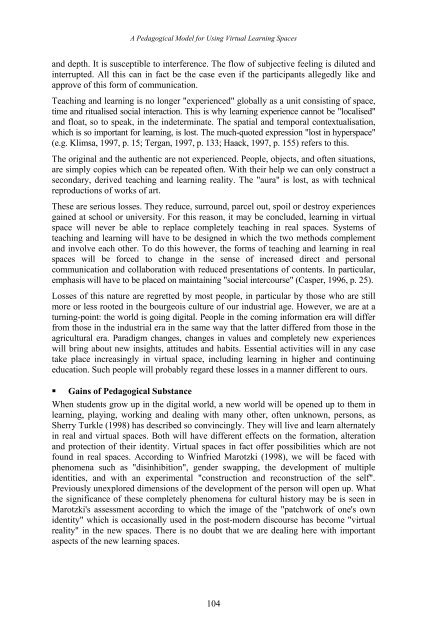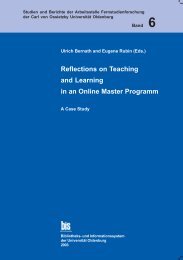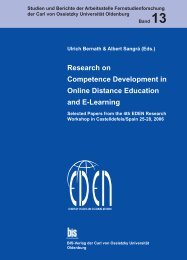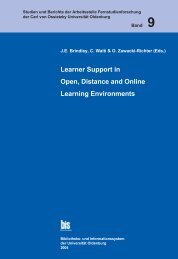Distance Education in Transition - Master of Distance Education ...
Distance Education in Transition - Master of Distance Education ...
Distance Education in Transition - Master of Distance Education ...
Create successful ePaper yourself
Turn your PDF publications into a flip-book with our unique Google optimized e-Paper software.
A Pedagogical Model for Us<strong>in</strong>g Virtual Learn<strong>in</strong>g Spaces<br />
and depth. It is susceptible to <strong>in</strong>terference. The flow <strong>of</strong> subjective feel<strong>in</strong>g is diluted and<br />
<strong>in</strong>terrupted. All this can <strong>in</strong> fact be the case even if the participants allegedly like and<br />
approve <strong>of</strong> this form <strong>of</strong> communication.<br />
Teach<strong>in</strong>g and learn<strong>in</strong>g is no longer "experienced" globally as a unit consist<strong>in</strong>g <strong>of</strong> space,<br />
time and ritualised social <strong>in</strong>teraction. This is why learn<strong>in</strong>g experience cannot be "localised"<br />
and float, so to speak, <strong>in</strong> the <strong>in</strong>determ<strong>in</strong>ate. The spatial and temporal contextualisation,<br />
which is so important for learn<strong>in</strong>g, is lost. The much-quoted expression "lost <strong>in</strong> hyperspace"<br />
(e.g. Klimsa, 1997, p. 15; Tergan, 1997, p. 133; Haack, 1997, p. 155) refers to this.<br />
The orig<strong>in</strong>al and the authentic are not experienced. People, objects, and <strong>of</strong>ten situations,<br />
are simply copies which can be repeated <strong>of</strong>ten. With their help we can only construct a<br />
secondary, derived teach<strong>in</strong>g and learn<strong>in</strong>g reality. The "aura" is lost, as with technical<br />
reproductions <strong>of</strong> works <strong>of</strong> art.<br />
These are serious losses. They reduce, surround, parcel out, spoil or destroy experiences<br />
ga<strong>in</strong>ed at school or university. For this reason, it may be concluded, learn<strong>in</strong>g <strong>in</strong> virtual<br />
space will never be able to replace completely teach<strong>in</strong>g <strong>in</strong> real spaces. Systems <strong>of</strong><br />
teach<strong>in</strong>g and learn<strong>in</strong>g will have to be designed <strong>in</strong> which the two methods complement<br />
and <strong>in</strong>volve each other. To do this however, the forms <strong>of</strong> teach<strong>in</strong>g and learn<strong>in</strong>g <strong>in</strong> real<br />
spaces will be forced to change <strong>in</strong> the sense <strong>of</strong> <strong>in</strong>creased direct and personal<br />
communication and collaboration with reduced presentations <strong>of</strong> contents. In particular,<br />
emphasis will have to be placed on ma<strong>in</strong>ta<strong>in</strong><strong>in</strong>g "social <strong>in</strong>tercourse" (Casper, 1996, p. 25).<br />
Losses <strong>of</strong> this nature are regretted by most people, <strong>in</strong> particular by those who are still<br />
more or less rooted <strong>in</strong> the bourgeois culture <strong>of</strong> our <strong>in</strong>dustrial age. However, we are at a<br />
turn<strong>in</strong>g-po<strong>in</strong>t: the world is go<strong>in</strong>g digital. People <strong>in</strong> the com<strong>in</strong>g <strong>in</strong>formation era will differ<br />
from those <strong>in</strong> the <strong>in</strong>dustrial era <strong>in</strong> the same way that the latter differed from those <strong>in</strong> the<br />
agricultural era. Paradigm changes, changes <strong>in</strong> values and completely new experiences<br />
will br<strong>in</strong>g about new <strong>in</strong>sights, attitudes and habits. Essential activities will <strong>in</strong> any case<br />
take place <strong>in</strong>creas<strong>in</strong>gly <strong>in</strong> virtual space, <strong>in</strong>clud<strong>in</strong>g learn<strong>in</strong>g <strong>in</strong> higher and cont<strong>in</strong>u<strong>in</strong>g<br />
education. Such people will probably regard these losses <strong>in</strong> a manner different to ours.<br />
� Ga<strong>in</strong>s <strong>of</strong> Pedagogical Substance<br />
When students grow up <strong>in</strong> the digital world, a new world will be opened up to them <strong>in</strong><br />
learn<strong>in</strong>g, play<strong>in</strong>g, work<strong>in</strong>g and deal<strong>in</strong>g with many other, <strong>of</strong>ten unknown, persons, as<br />
Sherry Turkle (1998) has described so conv<strong>in</strong>c<strong>in</strong>gly. They will live and learn alternately<br />
<strong>in</strong> real and virtual spaces. Both will have different effects on the formation, alteration<br />
and protection <strong>of</strong> their identity. Virtual spaces <strong>in</strong> fact <strong>of</strong>fer possibilities which are not<br />
found <strong>in</strong> real spaces. Accord<strong>in</strong>g to W<strong>in</strong>fried Marotzki (1998), we will be faced with<br />
phenomena such as "dis<strong>in</strong>hibition", gender swapp<strong>in</strong>g, the development <strong>of</strong> multiple<br />
identities, and with an experimental "construction and reconstruction <strong>of</strong> the self".<br />
Previously unexplored dimensions <strong>of</strong> the development <strong>of</strong> the person will open up. What<br />
the significance <strong>of</strong> these completely phenomena for cultural history may be is seen <strong>in</strong><br />
Marotzki's assessment accord<strong>in</strong>g to which the image <strong>of</strong> the "patchwork <strong>of</strong> one's own<br />
identity" which is occasionally used <strong>in</strong> the post-modern discourse has become "virtual<br />
reality" <strong>in</strong> the new spaces. There is no doubt that we are deal<strong>in</strong>g here with important<br />
aspects <strong>of</strong> the new learn<strong>in</strong>g spaces.<br />
104





